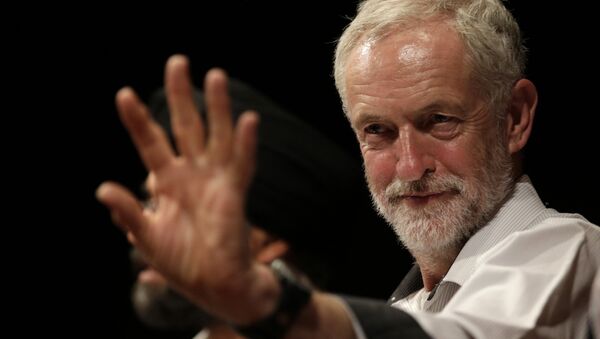UK Labour leader Jeremy Corbyn gave a nearly 30-minute speech at the Edinburgh Television Festival's Fintry auditorium Thursday, following up with a Q&A with British actress Maxine Peake.
"The British media isn't ready for the challenges of the 21st century," he told his audience. "So, it cannot serve the interests of a truly democratic society."
"When it comes to news and affairs, which is so absolutely vital for a democratic society, I believe our media, in many cases, is failing," he said.
A free press is essential to our democracy, but much of our press isn’t very free at all.
— Jeremy Corbyn (@jeremycorbyn) August 23, 2018
I want media workers to be free to do their best work, not held back by billionaire owners, tech giants or the state. #ChangeTheMedia
In his address, he proposed ending corporate control over the British media, including via social media platforms and "billionaire class" shareholders stifling independent journalism.
He also suggested forming an independent body to oversee the BBC's charter renewal process and imposing a windfall tax on tech companies operating in the UK.
Doing so would allow more transparency over future charter renewals and greater decentralization via expanded national and regional boards, elected by BBC staff and license fee payers, he stated.
In order to understand Jeremy Corbyn's sentiments, one must delve into the complicated nature of the Charter renewal itself, which carries heavy significance. Some of the amendments he has demanded already exist and some do not, but to which degree should they occur?
The Charter Renewal Process-A Brief Summary
According to the UK Parliament website, the BBC charter must undergo a revision every 10 years. The first process commenced in 1927 and the most recent one began New Year's Eve of 2016, when it was due to expire, Parliament said in a public report.
As of 2015, it also mentioned that "broadcasters, other stakeholders and politicians began positioning themselves in advance of negotiations," but there was no mention of public oversight.
The UK government has published both a Green paper and White Paper, which gave consultations on charter renewal terms. The Lords Communications Committee was heavily critical of the "behind-closed-doors" manner in which various groups inked the 2015 funding deal, Parliament stated.
The key point that Jeremy Corbyn addressed Thursday was not whether the unitary body was useful, but rather, how much public oversight truly existed in its affairs.
Previous Calls for a New Charter Renewal Process
Westminster also proposed a more democratic oversight structure of the BBC, calling for the company's Trust to "be replaced by a unitary BBC Board, with a separate Public Service Broadcasting Commission empowered to hold the Corporation to account," a Parliament statement read.
Parliament also states that "No more than half of the board members will be Government appointees," whereas Jeremy Corbyn wishes a completely public, independent board. Conversely, Parliament merely denotes that the BBC-approved unitary board will act "in the public's interest"
"Others argue that the BBC could be made more accountable through ‘mutualisation' — giving ‘membership' and voting rights to everyone who pays the licence fee," Parliament admitted.
Just prior to the most recent Charter agreement, the Culture, Media and Sport Committee's 2016 BBC Charter Review seconded this opinion, specifying that, "the creation of a strong unitary board for the BBC, with experienced and high-powered [non-executives] well able to challenge the executives, would offer the best chance of achieving clear direction for the BBC."
"[This] should give the BBC a better structure for decision-making while maintaining accountability to the licence fee payer," it concluded. It also followed up with a March 2016 report which reiterated support for greater public oversight into the BBC's undertakings.
"The [2016 Clementi Review] recommended that the BBC should have a single unitary board, collectively responsible for everything the BBC does, for delivering against the public purposes and other obligations of the Charter, and for acting in the public interest," the report said.
"It also recommended independent regulation by Ofcom. The government agrees," it continued.
Another important note is highlighted in the BBC Trust Protocol E1 (Part C), where the BBC Trust conducts value-for-money (VFM) investigations on the company's use of TV licensing fee revenues.
The National Audit Office defines VFM as economy, efficiency, and effectiveness-or in other terms-spending less, spending well, and spending wisely.
This is the crucial public oversight needed to hold the media channel accountable, and would give greater control over its operations, broadcasts, and content. Without full public accountability, the BBC becomes just another publicly-subsidized corporation, despite being minimally independent.
As PM, Corbyn could theoretically hold a plebiscite on the BBC to determine if it meets the people's needs and whether or not TV licensing funds are well-spent and effective.
Jeremy Corbyn is either deeply sinister, or a total idiot says Rod Liddle: https://t.co/NCYaUs3sPI
— Fraser Nelson (@FraserNelson) August 23, 2018
Other parliamentarians have complained about this lack of oversight in the BBC Royal Charter. Belfast North MP Nigel Dodds, the Democratic Unionist Party's (DUP) deputy leader, also demanded a royal commission retain oversight of the Charter renewal, Politics Home reported in April 2015.
He accuses the BBC and others of not being given any space in electoral campaign debates.
"One key thing we need to do is ensure the BBC does not exert such a distorting influence on British politics in this way again," he stated.
To date, Parliament has only partially reformed public media, but has failed to give a democratically-owned platform for the British public. Jeremy Corbyn's speech has reiterated this dire need for open media, which the British media directly accuses other governments of not having, but sadly does not possess itself. Implementing his new measures could inject exciting discourse into British media, finally for the many and not the few, in his party's own words.



